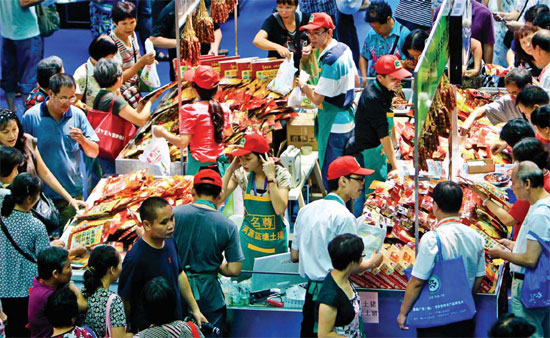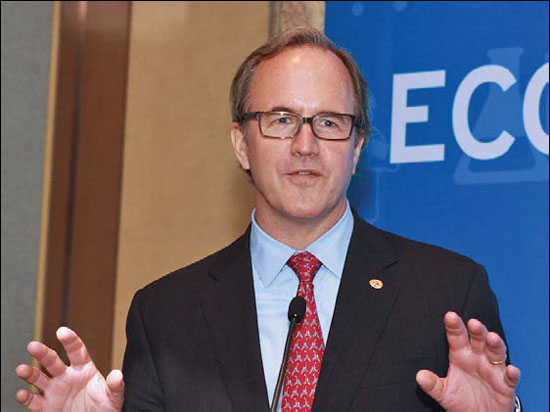Developing a recipe for food you can trust
Updated: 2012-10-05 07:14
By Shi Jing (China Daily)
|
|||||||||||
|
People flock to a food safety exposition in Foshan, Guangdong province. Photos provided to China Daily |
Ecolab opens new plant in Jiangsu province to tap opportunities from food safety
Ecolab Inc, the world's leading provider of water, hygiene, public health and energy technologies by sales volume, has opened a manufacturing plant and distribution center in Taicang, Jiangsu province.
The company's chairman of the board and chief executive officer, Douglas M. Baker Jr, describes it as a signal of its belief in China's "bright" future.
The Taicang hub, Ecolab's third-largest in the world and the largest in the Asia-Pacific region, cost $90 million. It has a designed annual production capacity of 150,000 metric tons and currently has 55 employees, a figure expected to exceed 350 by 2017.
It can produce the full portfolio of the company's products, including cleaning, sanitation, food safety and infection prevention across a wide range of industries including food and beverage production, retailing, hospitality and healthcare solely for the China market.
"We are doing this for two reasons. It costs a lot of money to ship our products. It gives clients a natural currency offer. If they buy, manufacture, pay labor and sell locally, currency is not a strategic problem," says Baker .
According to the General Administration of Customs, China's financial export volume growth rate fell by 18 percentage points year-on-year to 8 percent in the first six months of this year.
Zheng Yuesheng, a spokesman for the administration, says the figure was much lower than expected.
The Yangtze River Delta region is one of Ecolab's major markets. The biggest support the local government gave the company was infrastructure. The second was a tax incentive, says Baker.
When asked when the Taicang plant will make profits, Baker, a 53-year-old English major, says, jokingly, "next week".
"We don't look at plant profit in the same way as other people do. It's not how we measure things. We measure how our company is doing on a regional basis and across the country. Our expectation is that it will temporarily hurt profits. Obviously, when you invest in a facility, you have to pay for it. It's a new expense. But we expect in the next several years to have more capacity," says Baker.
"According to China's 12th Five-Year Plan (2011-2015), improving food quality and ensuring food safety will continue to be a major focus. The Taicang plant shows our commitment to providing innovative and sustainable products and services to support food safety and public health solutions in China," he adds.
US-based Ecolab entered China in 1987. Since 2008 it has invested $150 million in the emerging market. China currently accounts for 4 percent of Ecolab's global sales revenues. Baker forecasts that the growth of the China business, supported by six plants, including the one in Taicang, will double that of any other area in the world.
Baker started his career with Ecolab in 1989, holding key roles in marketing, sales and general management within the company. In July 2004, he was named president and CEO of the company and, in May 2006, added chairman of the board to his duties. In 2011 he led the company's merger with US-based water treatment company Nalco Co, an $8 billion transaction that nearly doubled the size of Ecolab.
Ecolab's sales had increased 62 percent by 2011 from when Baker took up the CEO role, and adjusted earnings per share have increased 133 percent, both prior to the inclusion of the Nalco transaction.
Baker says what he really cares about and is proud of is the zero waste-water factory the company provides for companies.
"It's a significant part of the investment and it's throughout the design. If you design it at the beginning, it doesn't really cost more to engineer it. But if you do not plan it that way, it will cost a lot more money to fix it," Baker says.
The central government has made environmental protection and the greening of the economy two of the top tasks during the 12th Five-Year Plan, elements to which Ecolab abides.
It looks at reducing the need for water, drainage, re-use, minimizing use and recycling.
Food safety involves treating water because it is the most common way of ensuring food is free from contamination. "Within the long term, there is going to be pressure in many countries on water. China's got a water scarcity challenge. There is less fresh water per head in China. It's about 28 percent of the rest of the world," says Baker. "Industrial and cultural expansion puts real pressure on fresh water. All of us have to be smarter about how we use our resources."
According to the 2011-2012 China Water Treatment Medicals Market Development Report released by the China Market Research Center, the world's demand for water treatment chemicals is largely driven by ever-growing demand in China and India, up about 5.7 percent annually. The center predicted that the market volume of the world's water treatment industry will amount to $5.9 billion in 2013.
Consequently, international giants including General Electric Co, Kentucky-based specialist chemical company Ashland, and Kurita Water Industries Ltd from Japan all entered the Chinese market long ago.
Regarding food safety, Ecolab says it aims to ensure the food process minimizes bacteria. "The food safety business involves education, the design process, measurement. We do that for food and beverage manufacturers all over the world," says Baker.
His company is bringing that expertise here and partnering with the government to make sure it is in line with the food safety plans the government has put in place. "We also share best practices to educate and help the industry grow," says Baker.
For Ecolab, there are a number of challenges here, not least the huge population. There's huge advancement over a very short period of time in China. Having first visited China in 1988, Baker says he cannot recognize the country each time he comes. He says he keeps asking himself: "How can you possibly develop something so amazing right away?
"With speed, there come some challenges. This is a natural part of the great success," he says, attributing more cases of food safety alarms to increasing consciousness about the issue, advanced technologies regarding testing and a more transparent environment.
"Even in the US, food safety issues are on the decline but people think they are up because we can identify the cause, trace it back and the media is much more inclined to report them, so the problem in one part of the country is reported in another."
Ecolab will increasingly focus on the food and environment safety businesses in China, which Baker believes will be little affected by slower economic growth because they are sectors closely connected to people's everyday life.
shijing@chinadaily.com.cn
|
Douglas M. Baker Jr. says US-based Ecolab Inc regards food safety as one of its core businesses in China. Photos provided to China Daily |
(China Daily 10/05/2012 page21)
Today's Top News
Rescuers race against time for quake victims
Telecom workers restore links
Coal mine blast kills 18 in Jilin
Intl scholarship puts China on the map
More bird flu patients discharged
Gold loses sheen, but still a safe bet
US 'turns blind eye to human rights'
Telecom workers restore links
Hot Topics
Lunar probe , China growth forecasts, Emission rules get tougher, China seen through 'colored lens', International board,
Editor's Picks

|

|

|

|

|

|







